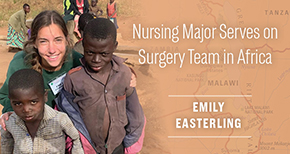 August 11, 2022 (Malawi, Africa) - School of Nursing senior Emily Easterling traveled to Lumbadzi, Malawi with a team of physicians and nurses to provide locals with essential medical care. Her team completed 29 surgeries in five days between two operating rooms.
August 11, 2022 (Malawi, Africa) - School of Nursing senior Emily Easterling traveled to Lumbadzi, Malawi with a team of physicians and nurses to provide locals with essential medical care. Her team completed 29 surgeries in five days between two operating rooms.
The lack of transportation, financial means, and travel time contributes to the lack of accessible healthcare in Malawi. The hospitals and health centers that do exist are challenged with staff and supply shortages. With a population of about 20 million, only two physicians exist for every 100,000 Malawians. “The need for medical assistance in Malawi is overwhelming,” said Easterling.
Easterling's sister, Susan, is a traveling nurse and encouraged her to join the team of physicians, nurses, and nursing students. The team, organized by the Chikhondi Health Foundation, worked with a local hospital in Malawi called Blessings Hospital.
Easterling spent each day of the week working in different settings within the hospital. From the time patients arrived to when they were discharged, she worked in four rotations: pre-op, operating room, post anesthesia care, and recovery. These different rotations involved a variety of care, from monitoring vital signs and starting IVs to administering medications and reporting records to ward nurses.
“This trip gave me so much experience towards my nursing career,” said Easterling. “I was able to perform so many clinical skills that I have learned and practiced many times in lab. The transition between moving my skills from a lab or simulation setting to the real world was so valuable.”
Easterling's work expanded outside the walls of Blessings Hospital. She and a team of Malawian nurses would travel to surrounding villages in a mobile clinic. “Inside of a small church with dirt floors, we shifted the building into a clinic with blue tarps hanging from the ceiling as privacy walls. Patients came from the village to be seen by the medical assistant, and many of these patients did not have the transportation to make it to town, but the mobile clinic provided an opportunity to receive care.”
This trip changed Easterling's perspective on nursing. “This experience took nursing to its most pure form,” observed Easterling. “Monitors were eliminated, alarms did not exist, and charting was done on paper. The patients were so grateful to receive medical care. They gave me a renewed sense of compassion for my patients. The holistic care of patients was reinforced by being immersed in a culture that emphasizes relationships, extends appreciation, and holds tightly to their faith.”
